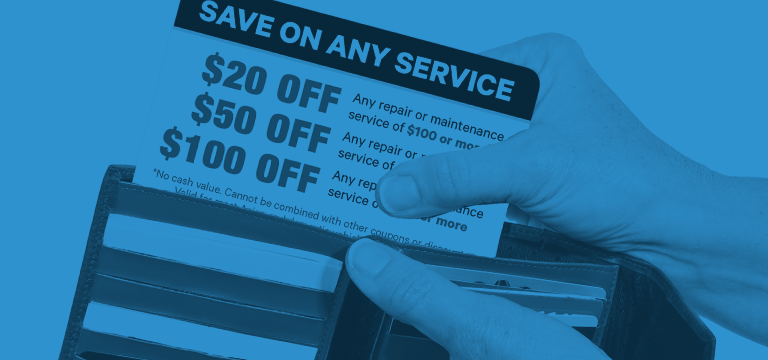Key Takeaways
- 79% of consumers reported they would use a coupon for auto repair services
- Customers with higher incomes are equally as likely to use a coupon as customers with lower incomes.
- Determining your customers lifetime value is critical.
- Removing your current customers from your new customer acquisition marketing can eliminate the bottom feeders.
To coupon or not to coupon, that is the question. The following insights will help you make a smart decision on the best strategy for your shop. However, before we begin, we would like to utilize our psychic abilities and address two things that have already crossed your mind.
1. You don’t want to be a discount shop!
2. You want to avoid the dreaded “Bottom Feeder Customers!”
Don’t worry; we will address both concerns shortly, but first, let’s look at some numbers. In our latest consumer research and insight report “Cracking The Code”, We asked 8,260 drivers if they would use a coupon or special if they received it in the mail from a reputable repair shop offering a discount on products or services they need.
A Resounding 79% Said YES, They Would.
The appetite and demand for coupons/specials are extremely high. However, what isn’t as clear is the correlation between consumers who use coupons and their income level. Would it surprise you that consumers with higher incomes are equally as likely to use a coupon/special as consumers with lower incomes? Well, that is exactly the case. Based on the results of our research broken down by level of income as compared to the propensity of those who reported Yes, they would use a coupon/special or No, they would not use a coupon/special, you can see that income level does not play a factor as to whether consumers would use a coupon/special or not.
So, Should Your Shop Offer Coupons?
The answer is almost always YES, YES, YES, and here is why.
The demand for coupons/specials is high. Furthermore, coupons/specials often attract new customers. However, the key is that you truly understand the lifetime value (LTV) of each customer. In other words, look beyond what a new customer might spend on their first repair order by taking a closer look at what they will spend at your shop over the time they remain your customer. This LTV calculation uncovers each customer’s true value.
For example, if your shop’s average repair order is $400, each customer comes into the shop twice a year, and they remain a customer for five years, their actual value or LTV to your shop will be $4,050. This also doesn’t account for the potential of these customers to have a second or third vehicle and any referrals they may bring to you for doing a great job, which would only compound this number.
After determining your customer LTV, the only question remaining is whether it is worth offering a very small discount to attract new customers who would, on average, spend $4,050 at your shop (based on our example above).
But You Still Don’t
Want The Bottom Feeders.
Download Cracking the Code Automotive To Learn More About Your Shop’s Customers
& Access Mail Shark’s Latest Consumer Research And Insights Report.
What Else You’ll Learn:
- What Google rating can hurt your shop?
- How often do your customers want to hear from you?
- Do customers want their vehicles sanitized?
- How much can drivers afford for repairs?
- Do drivers trust auto repair shops?
- How to build trust with customers?
- Who uses coupons?
- & Much More!
